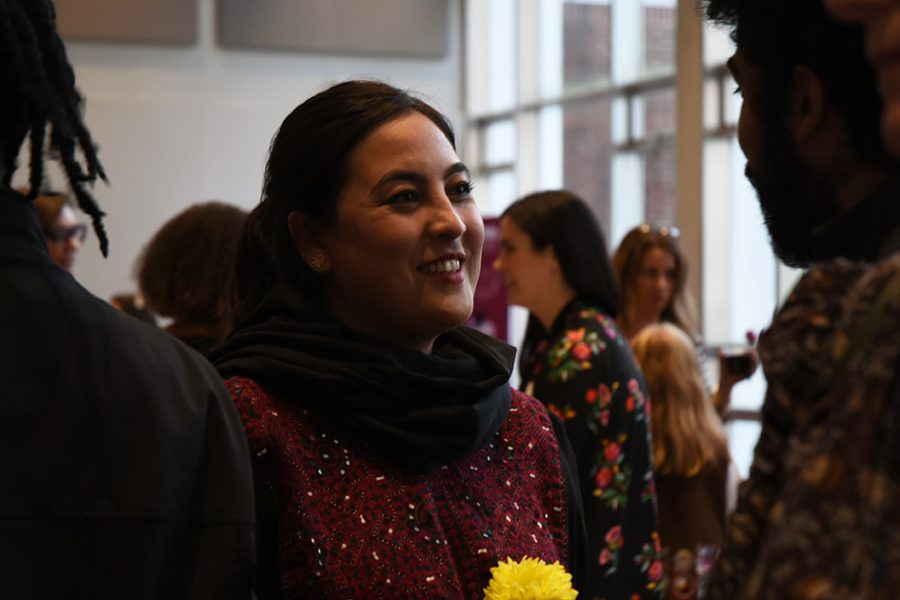Loyola law makes new home for Afghani human rights activist
Negina Khalili talks to students and faculty at the International Women’s Day event on March 8. Khalili is serving as a visiting professor at Loyola
March 21, 2023
Negina Khalili has made standing up for Afghanistan’s women and girls her life’s work.
As the first female prosecutor from her home province in Afghanistan, she used her position in the country’s Attorney General’s office to fight for women who’d long been marginalized by male-only legal systems that refused to take gendered violence seriously.
On Aug. 15, 2021, Khalili watched from her office as years of her hard work were crushed under the Taliban’s tires when the extremist group took control of Kabul following the United States’ total withdrawal from the country.
“That day, I saw a government that’d been built for 20 years lose everything in one second,” Khalili said. “It wasn’t just a collapsing of government; it was my generation that collapsed. Women in Afghanistan collapsed. They are the main victims of this war.”
The Taliban has long opposed education for girls and work opportunities for women, along with perpetrating countless acts of gendered violence, Khalili said. Khalili prosecuted many cases against members of the Taliban, which put her in grave danger once the group took power.
When Kabul fell, Khalili fled to the United States. Her family was not lucky enough to escape.
“What happened to Afghanistan is a nightmare for me,” Khalili said. “I worried my family wouldn’t be alive because my work went against the Taliban.”
While shouldering the weight of the trauma and uncertainty that defined her first day as a refugee, Khalili found a path to continue her fight when she received an offer to lecture on international human rights law at Loyola University New Orleans.
“It is my privilege and my honor to be at Loyola University,” she said. “I’m so grateful to be here.”
Since arriving in America, Khalili has relentlessly spoken out about what the Taliban is doing to her country. Last week, she led a discussion alongside Loyola’s College of Law Dean Madeleine M. Landrieu about courageous leadership as part of Loyola’s International Women’s Day celebration.
“I think it’s really important people hear Professor Khalili’s story,“ said Patricia Boyett, the director of Loyola’s Women’s Resource Center and one of the event’s organizers.“The light has really gone out on Afghanistan.”
In addition to providing the Loyola community with role models for courageous leadership, Boyett said she hoped the event would bring attention to Khalili’s family’s situation and all the ongoing suffering in Afghanistan.
As a prosecutor, Khalili said her job was to enforce the American-supported Afghan government’s recently passed laws meant to eliminate violence and harassment towards women. She tackled cases involving honor killings, forced child marriages, and domestic violence. Some of the cases she prosecuted garnered international attention, Khalili said, including a case where a family arranged a marriage between their 5-year-old daughter and a 60-year-old man.
Khalili said the issue of forced early marriages for Afghan girls has only gotten worse as mass hunger has gripped the nation.
“I’m sure it’s increased and is increasing day-by-day,” she said. “Because of poverty in Afghanistan, no work, no financial resources, some families are forced to sell their daughters to feed other members of the family.”
While Khalili said her heart and mind haven’t left her home, she’s stayed true to her mission since arriving in New Orleans. In addition to teaching her classes on international human rights law, Khalili has joined Boyett on staff at Loyola’s Women’s Resource Center where Victoria Bolden, the center’s student director of women’s leadership, said she’s made an instant impact.
“Professor Khalili has been wonderful to work with at the Women’s Resource Center,” said Bolden, a psychology senior. “In a few short months working with her, I have learned so much and broadened my own understanding of the needs of women worldwide. I hope students can learn from her story and are inspired to take action in their own lives to better the future of girls and women everywhere.”
Khalili said she hopes to help her American students and those who hear her speak better understand the fragile nature of human rights everywhere while inspiring them to take action.
“I want my students to know what’s going on in the world,” she said. “If something happened in one country, it can occur in the United States.”








